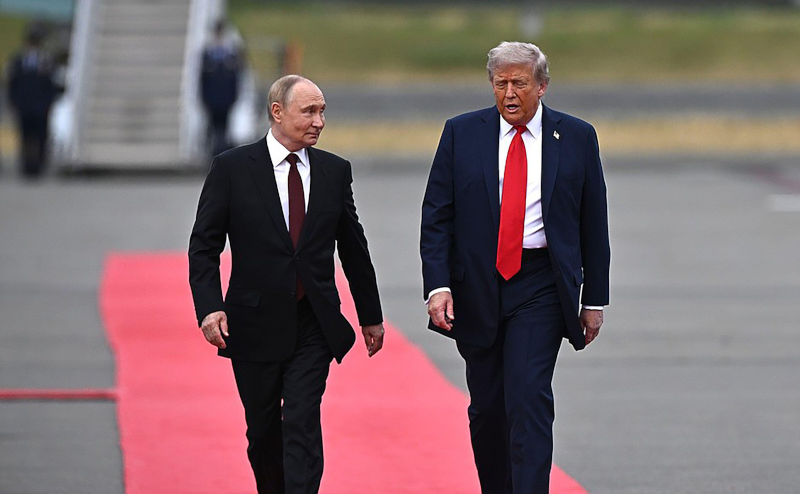Taking a win from Alaska
August 29, 2025
On 15 August, US President Donald Trump and Russian President Vladimir Putin met in Alaska, the first head-of-state meeting between the two countries since the Ukraine War began.
It was widely panned as a “shameful” and “vomit-inducing” episode where Putin apparently came out on top.
Trump himself certainly didn’t help things. In front of Putin, he continued insisting that a “Russia hoax” prevented him from building better relations with Moscow during his first term, was pleased that Putin backed him up on the argument that “the war would have never happened under Trump”, and even entertained Putin’s views on “ mail-in ballot fraud”, effectively bashing his domestic political opponents in front of an adversary.
None of this amounted to a real concession to Putin; while embarrassing for many Americans, they simply recycled Trump’s classic talking points. The true concession was in holding the meeting itself, which effectively ended Putin’s diplomatic isolation in the West, with apparently nothing to show for it.
Indeed, there was no agreement on a ceasefire, no peace deal, not even a clear roadmap. Trump asserted that agreement had been reached on “most of the points,” with only “a few left”, including “one that is probably the most significant, but we have a very good chance of getting there”, which raises more questions than it answers, given the gulf between Russian and Ukrainian positions.
Still, it could have been worse. Europeans were relieved that Trump stressed it is ultimately up to Ukraine to negotiate peace, a rhetorical nod to Zelenskyy’s “nothing about Ukraine without Ukraine”. Yet Trump has effectively narrowed the practical meaning of this principle: instead of Washington sustaining full support for Kyiv until Zelenskyy seeks compromise, it now appears to mean only that Trump will not openly force Ukraine into territorial concessions.
However, reading between the lines of the meeting, particularly Putin’s remarks, the picture becomes more complex. He dwelled on the World War II alliance between the US and the USSR in defeating the Axis powers; while this played into Russia’s “historical memory battle” with the West over credit for Allied victory, he also thanked the US for Lend-Lease support, something usually downplayed in Russian propaganda.
He also refrained from reaching further back in history to justify Russian claims over Ukraine. Instead, he explicitly called the “Ukrainian nation” a “brotherly nation” to Russia, implying Ukraine is not subsumed into his vision of the Russian nation. Whether this reflects a genuine shift or is merely a tactical rhetorical concession to Trump remains to be seen.
While he did once again stress the need to address the “root causes” of the conflict, namely “to consider all legitimate concerns of Russia and to reinstate a just balance of security in Europe and in the world on the whole”, he also agreed that “naturally, the security of Ukraine should be ensured as well”; Putin framed this as something Trump pushed him to agree to.
Since the meeting, there has been a “he said, she said” debate about what exactly Putin meant. US envoy Steve Witkoff claimed Putin accepted the idea of the US providing “Article 5-like security guarantees” for Ukraine, which would mark the most significant concession in Russia’s position since the war began, and could even open a path to a negotiated solution, as it would resolve one of Ukraine’s fundamental concerns; while Ukraine would not legally surrender lost territory, it could at least now live with a lasting truce. European leaders seized on this interpretation, when they joined Zelenskyy to collectively raise the issue with Trump.
Russian Foreign Minister Sergey Lavrov quickly rejected Witkoff’s version, stressing in a press conference that any guarantees for Ukraine must also account for Russia’s security and include Russia and China, potentially others as well. That position would mark no concession at all, and simply restates Russia’s April 2022 stance.
It is difficult to say which version is closer to the truth; in fact, both could be true to some extent. It may be that, just as Trump’s intervention has disrupted Western unity on Ukraine, it has also introduced rifts into Russia’s own calculations about rapprochement with the West.
It’s clear that at least some of Lavrov’s claims during that press conference weren’t accurate, particularly his assertion that the US is against continued weapons supply to Ukraine, as the US authorised delivery of ERAM missiles to Ukraine soon after Lavrov’s remarks. Trump isn’t about to completely abandon Ukraine, and is willing to exert meaningful pressure on Russia.
Now is the time to hold the line and present a united Western position. As long as Putin’s actual remarks in Alaska can credibly be interpreted as a real concession, Trump should ignore any contrary comments made by Putin’s underlings, and demand that Putin either honour the commitments made to his face, or else publicly and personally clarify the Russian position. That would quieten Trump’s critics, and show that hosting Putin was, perhaps, not a bad idea after all.
The views expressed in this article may or may not reflect those of Pearls and Irritations.

